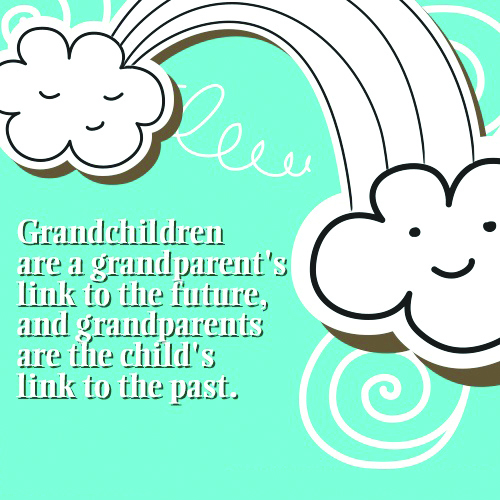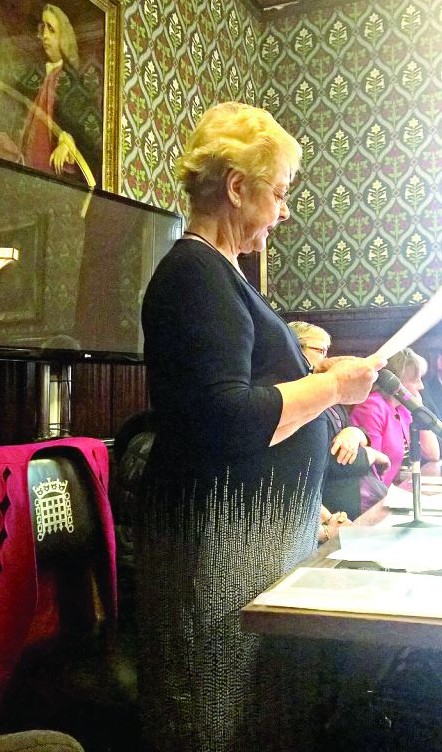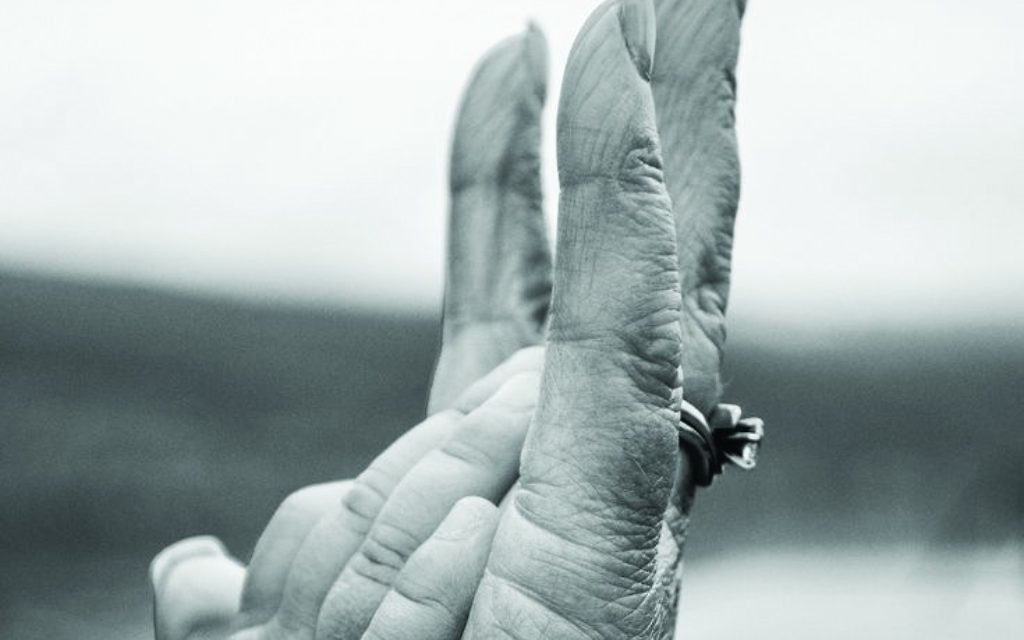‘My biggest fear is that I’ll die without meeting my grandchildren’
Festivals are a painful time for grandparents who are estranged from their grandchildren. Alex Galbinski speaks to members of a group fighting for access
When you think of a seder night, you picture the generations huddled together around the table. The grandparents are kvelling as they watch the younger grandchildren sing the Ma Nishtana, while they in turn squeal in excitement at the prospect of finding the afikoman.
But this won’t be the case for Elaine, a grandmother of two. She is beside herself with anxiety; for the past three months she has been denied any contact with Hannah, her seven-year-old granddaughter. Hannah’s mother, who is divorced from Elaine’s son, has taken umbrage that he is having a baby with his new wife.
“These past months have been hell and I don’t know when it’s going to end. Worst of all I know it’s not what Hannah wants because we are so close, ” explains the 63-year-old.
Get The Jewish News Daily Edition by email and never miss our top stories Free Sign Up
“It’s heartbreaking. My husband and I are not sleeping at night – we’re talking about it 24/7. I’m wondering what Hannah’s thinking – does she think we don’t care or don’t love her anymore? We’re a close-knit family and we’re all on edge.”
Elaine has been prevented from seeing Hannah before, once going without contact for nine months. In better times, they spoke each week and Hannah’s father is now seeking access to her through solicitors.
Unlike in other countries, grandparents in the UK do not have automatic legal rights to contact their grandchildren. In some cases, they have to apply to the family court for permission, then, if this is granted, they have to formally apply to see their grandchildren. This process could cost thousands of pounds – with no guarantee of success.
Lorraine Bushell, founder of the Hendon Grandparents Support Group, a group for Jewish grandparents, is lobbying the government to make the process easier.
She, along with 60 other grandparents, 12 MPs-including Hendon MP Matthew Offord, celebrity Dame Esther Rantzen and divorce lawyer Vanessa Lloyd Platt went to Parliament in January to raise awareness of the plight of the estimated one million grandchildren who aren’t able to see their grandparents.
This month, the group launched a petition to ask Parliament to support the rights of children to have an ongoing relationship with their grandparents. Their aim is to get 100,000 signatures to trigger a debate.
Lorraine, 78, from north-west London, is reluctant to tell her story in case it worsens her situation with her son and daughter-in-law, but confirms she doesn’t have contact with her own grandchildren.
“I started the group four years ago because there was nothing for Jewish grandparents,” she explains. “People think Jewish families are wonderful, and have all these get-togethers on the Yom Tovim, but it’s not always true.
“It’s a very difficult topic to discuss. If you go on holiday and people ask if you have grandchildren, you don’t want to say: ‘Yes, but I don’t see them.’ We don’t say we can make it right, but we listen and try to help and put things into perspective.”
Lorraine was herself terribly affected by the lack of contact with her grandchildren, which started when they were born. The oldest is now 15.
“At the beginning, I thought I’d have a nervous breakdown because it was making me very ill,” she admits. “I was in floods of tears the whole time.”
Lorraine compiles a scrapbook for them, should they come looking for her. “Perhaps, in the future, I can convey the message that I did want to see and get to know them. They are being brought up with only half the family and that’s not good.”
Family rifts can be caused by divorce, disputes, the death of a parent or a remarriage, and sometimes the cause is small but it blows up out of proportion.
Vanessa has seen many such cases in her legal practice, Lloyd Platt & Co. “Often these disputes can be caused by the most innocuous remark. A grandparent can say something they think is helpful, but it’s seen as a parenting criticism.”

Lorraine believes there is a greater role for rabbis to play in bridging the gaps between the generations. “When people get married, maybe the rabbonim could stress that family is very important and that, whatever happens, to keep that unity.”
This is echoed by Jeffrey Gold, who says his daughter distanced herself from him while at university and then completely after marriage, accusing him of ‘verbally abusing’ her throughout her childhood, which he denies.
“When she was pregnant, I heard about it through a friend of a friend. She never told me about the bris, never sent me any pictures.”
His daughter now has four children, and Jeffrey took her to court to enable contact with them. It ruled she has to send him photographs of them every six months. “My eldest grandchild is nearly 10 and I’ve seen pictures of him, but I’ve never met him. I do cry about it. These children are missing out on the love and affection of a grandparent,” he says.
“My daughter and son-in-law are purportedly frum people and I have approached their rabbi to mediate, but he refused. I believe rabbis are the ones who should bring parties together and we should agree to abide by any decision they make.”
Jeffrey was diagnosed with cancer five years ago. “My biggest fear is that I’ll die without ever having met my grandchildren.”
Moved by the grandparents’ suffering, Rabbi David Mason of Muswell Hill Synagogue is a supporter of the group and wants other ministers to be aware that grandparent estrangement is on the rise.
“In the past, it was clear grandparents were part of the family structure; in the complicated nature of family life, it is now always possible that things can turn against them and they don’t have redress,” he explains. “The legal process is tricky and going to court can make the situation worse.”
He agrees rabbis have a role to play in trying to bring together warring parties, but says it is more complex than just approaching the ‘other’ side.
“It is hard for rabbis because the struggle is between the adult children and the grandparents and you are the rabbi of one of those sides. It might be better for rabbis to work together when there is an alienation.”
Norwood chief executive Elaine Kerr describes the benefits of children having contact with grandparents as one of the most positive elements in a child’s life. “They provide consistency for children whose parents are separated,” she says and also agrees about the positive role of mediation.
“Grandparents should separate out their own feelings about the children’s parents and their issues, so they do not impact on the children. Time with grandparents is often one of the things that separated couples disagree on and it takes a trained individual mediator to resolve this.”
Rachel Jaysan, a specialist family solicitor and accredited mediator who works for the Jewish Marriage Council (JMC), agrees. “Mediation is a less hostile and a more cost-effective way to resolve familial disputes [than going to court],” she explains.
“We work to explore whether any lines of communication can be kept open,” says Adele Weider, a family therapist at the JMC.
“While understanding the enormous worth of the grandparent/grandchild relationship, ensuring the children do not become pawns is crucial. We create different narratives by talking about what has happened from multiple perspectives.”
Vanessa and fellow campaigners want to find out what grandparents think would make a difference. “We’re not saying we want to take away any of the parents’ rights, but we want some kind of situation where grandparents can’t so easily be ousted,” she says.
In the meantime, people like Elaine, Gerald and Lorraine are still suffering. “It’s a complete nightmare – it’s killing me,” Elaine says. “It’s going to be a long road this time.”
Hendon Grandparents Support Group can be contacted via hendongrandparents@gmail.com
The petition is at https://petition.parliament.uk/petitions/188381

Thank you for helping to make Jewish News the leading source of news and opinion for the UK Jewish community. Today we're asking for your invaluable help to continue putting our community first in everything we do.
For as little as £5 a month you can help sustain the vital work we do in celebrating and standing up for Jewish life in Britain.
Jewish News holds our community together and keeps us connected. Like a synagogue, it’s where people turn to feel part of something bigger. It also proudly shows the rest of Britain the vibrancy and rich culture of modern Jewish life.
You can make a quick and easy one-off or monthly contribution of £5, £10, £20 or any other sum you’re comfortable with.
100% of your donation will help us continue celebrating our community, in all its dynamic diversity...
Engaging
Being a community platform means so much more than producing a newspaper and website. One of our proudest roles is media partnering with our invaluable charities to amplify the outstanding work they do to help us all.
Celebrating
There’s no shortage of oys in the world but Jewish News takes every opportunity to celebrate the joys too, through projects like Night of Heroes, 40 Under 40 and other compelling countdowns that make the community kvell with pride.
Pioneering
In the first collaboration between media outlets from different faiths, Jewish News worked with British Muslim TV and Church Times to produce a list of young activists leading the way on interfaith understanding.
Campaigning
Royal Mail issued a stamp honouring Holocaust hero Sir Nicholas Winton after a Jewish News campaign attracted more than 100,000 backers. Jewish Newsalso produces special editions of the paper highlighting pressing issues including mental health and Holocaust remembrance.
Easy access
In an age when news is readily accessible, Jewish News provides high-quality content free online and offline, removing any financial barriers to connecting people.
Voice of our community to wider society
The Jewish News team regularly appears on TV, radio and on the pages of the national press to comment on stories about the Jewish community. Easy access to the paper on the streets of London also means Jewish News provides an invaluable window into the community for the country at large.
We hope you agree all this is worth preserving.
-
By Brigit Grant
-
By Laurent Vaughan - Senior Associate (Bishop & Sewell Solicitors)
-
By Laurent Vaughan - Senior Associate (Bishop & Sewell Solicitors)
-
By Laurent Vaughan - Senior Associate (Bishop & Sewell Solicitors)
-
By Laurent Vaughan - Senior Associate (Bishop & Sewell Solicitors)






















